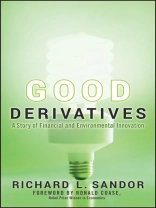Through the eyes of an inventor of new markets, Good
Derivatives: A Story of Financial and Environmental Innovation
tells the story of how financial innovation – a concept that
is misunderstood and under attack – has been a positive force in
the last four decades. If properly designed and regulated, these
‘good derivatives’ can open vast possibilities to
address a variety of global problems. Filled with provocative
ideas, fascinating stories, and valuable lessons, it will provide
both an insightful interpretation of the last forty years in
capital and environmental markets and a vision of world finance for
the next forty years.
As a young economist at the Chicago Board of Trade, Richard
Sandor helped create interest rate futures, a development that
revolutionized worldwide finance. Later, he pioneered the use of
emissions trading to reduce acid rain, one of the most successful
environmental programs ever. He will provide unique insights into
the process of creating these new financial products. Covering
successes and failures, the story describes the tireless process of
inventing, educating and creating support for these new inventions
in places like Chicago, New York, London, Paris and how it is
unfolding today in Mumbai, Shanghai and Beijing.
The book will tell the story of the creation of the Chicago
Climate Exchange and its affiliated exchanges (European Climate
Exchange, Chicago Climate Futures Exchange and Tianjin Climate
Exchange, located in China). The lessons learned in these markets
can play a critical role in effectively addressing global climate
change and other pressing environmental issues. The author argues
that market-based trading systems are a far more effective means of
reducing pollutants than ‘command-and-control’.
Environmental markets may ultimately help to find solutions to
issues such as rainforest destruction, water problems and
biodiversity threats.
Written in an engaging, narrative style, Good Derivatives
will be of interest to both practitioners and general readers who
want to better understand the creative process of financial
innovation. In the middle of so much distrust of markets, it is
also a recipe of how transparent, well-regulated markets can be a
force for good in the environmental, health, and social areas.
表中的内容
Foreword ix
Preface xiii
Acknowledgments xxi
Chapter 1 The Early Years 1
Chapter 2 Trying to Change the World 23
Chapter 3 The Berkeley Years 47
Chapter 4 The Chicago Board of Trade Years: The
Commodity Futures Contract 65
Chapter 5 The Chicago Board of Trade Years: Financial
Futures Contract 89
Chapter 6 Educating Users and Building the Market 125
Chapter 7 Treasury Bond and Note Futures 139
Chapter 8 The Decade of the Eighties 167
Chapter 9 Globalizing Chicago Exchanges 191
Chapter 10 Environmental Finance 205
Chapter 11 Blame It on Rio 223
Chapter 12 The Beginning of the Entrepreneurial Years 239
Chapter 13 You’re Gonna Trade What? 265
Chapter 14 From the Pit to the Box 291
Chapter 15 Conceiving a New Kind of Exchange 313
Chapter 16 The Twenty-First Century Lighthouse 327
Chapter 17 CCX Market Architecture 351
Chapter 18 Chicago Climate Exchange 375
Chapter 19 The Rise of the Chicago Climate Exchange 393
Chapter 20 The Fall of the Chicago Climate Exchange 413
Chapter 21 The Chicago Climate Futures Exchange 429
Chapter 22 The European Climate Exchange 453
Chapter 23 India 479
Chapter 24 Opening New Markets in China 501
Chapter 25 Good Derivatives 533
Appendixes 559
Acronyms 575
Glossary 577
Index 593
关于作者
RICHARD L. SANDOR is Chairman and Chief Executive Officer of Environmental Financial Products LLC, which specializes in inventing, designing, and developing new financial markets with a special emphasis on investment advisory services.??EFP was established in 1998 and was the predecessor company and incubator to the Chicago Climate Exchange (CCX), the European Climate Exchange (ECX), and the Chicago Climate Futures Exchange (CCFE). Dr. Sandor was honored by the City of Chicago for his contribution to the creation of financial futures and his universal recognition as the ‘father of financial futures.’ In October 2007, he was honored as one of Time magazine’s ‘Heroes of the Environment’ for his work as the ‘Father of Carbon Trading.’ Dr. Sandor is a Distinguished Professor of Environmental Finance at Guanghua School of Management at Peking University and a Lecturer in Law at The University of Chicago Law School.












